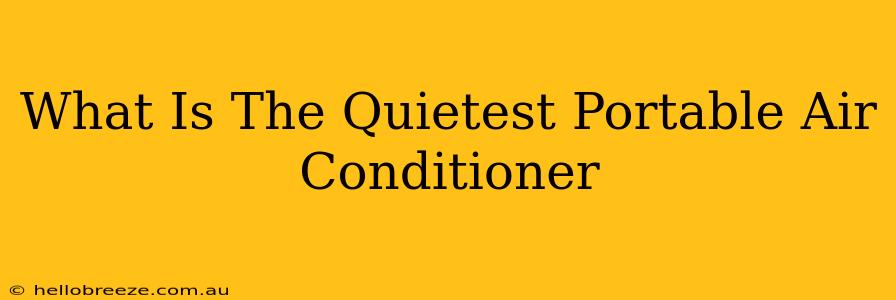Summer heat can be unbearable, but the constant drone of a portable air conditioner can be just as frustrating. If you're searching for a cool escape without the noisy intrusion, you're in the right place. This guide will help you navigate the world of quiet portable AC units and find the perfect fit for your needs.
Understanding the Noise Levels of Portable AC Units
Portable air conditioners, by their nature, generate some noise. The noise level is typically measured in decibels (dB). A whisper is around 30dB, normal conversation is about 60dB, and a vacuum cleaner can reach 80dB or more. Most portable AC units fall somewhere between 50dB and 65dB. However, the quietest portable air conditioners generally operate below 55dB.
Factors Affecting Noise Levels:
Several factors influence how loud a portable air conditioner operates:
- Compressor: The compressor is the heart of the AC unit and is the biggest contributor to noise. Higher-efficiency compressors tend to be quieter.
- Fan Speed: Higher fan speeds mean more airflow, but also more noise. Many units offer multiple fan speed settings allowing you to adjust the noise level to your preference.
- Unit Design: The overall design and quality of construction can affect how much noise is generated and how effectively it's dampened.
- Location: Placing the unit on a soft surface like a rug can help absorb some vibrations and reduce noise.
Key Features to Look for in a Quiet Portable AC Unit
When shopping for a quiet portable AC unit, consider these crucial features:
- Decibel Rating: Pay close attention to the manufacturer's stated decibel rating. Look for units with a dB rating below 55dB.
- Multiple Fan Speeds: The ability to adjust the fan speed gives you greater control over the noise level.
- Sleep Mode: Many quiet portable AC units offer a sleep mode that further reduces noise and energy consumption.
- Compressor Type: Research the type of compressor used. While not always explicitly stated, some compressor technologies are inherently quieter than others.
- Customer Reviews: Check online reviews from other users. Their experiences can offer valuable insights into the actual noise level of a particular model.
Top Considerations When Choosing a Quiet Portable Air Conditioner:
Choosing the right quiet portable air conditioner involves more than just looking at the dB rating. Think about:
- Room Size: Ensure the unit's cooling capacity (BTUs) matches the size of the room you intend to cool. A unit that's too small will work harder and might be noisier.
- Energy Efficiency: Look for an Energy Star rating to save on electricity costs. Often, more energy-efficient models are also quieter.
- Features: Consider additional features like dehumidification, a timer, and remote control, which can enhance your comfort and convenience.
Maintenance for Optimal Quiet Operation
Regular maintenance will help keep your portable air conditioner running quietly and efficiently:
- Clean the Filters: Regularly clean or replace the air filters to prevent airflow restrictions which can cause the unit to work harder and become louder.
- Check the Coils: Clean the condenser coils to remove dust and debris that can impede cooling and increase noise.
- Inspect the Exhaust Hose: Ensure the exhaust hose is properly sealed and free from blockages.
By following these tips and carefully considering your needs, you can find the quietest portable air conditioner that provides a refreshing escape from the summer heat without disturbing the peace and quiet of your home. Remember, prioritizing quiet operation often means a slightly higher initial cost, but the investment in your peace and quiet will be worth it.

